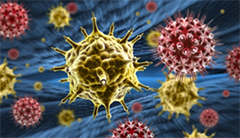An extremely effective weapon against cancer

The HPV vaccine protects not only against cervical cancer, but also other dangerous carcinomas such as vulvar, vaginal, penile, and oropharyngeal cancers.
At the beginning of June, the Standing Vaccine Committee (STIKO) at the Robert Koch Institute decided to recommend vaccination against human papillomaviruses (HPV) not only for girls, but also boys aged 9 to 14. "This decision was long overdue," says PD Dr. Maximilian Klar, senior consultant in the Department of Obstetrics and Gynecology of the Medical Center - University of Freiburg: "With this vaccine we have an extremely effective weapon against cervical cancer." The gynecologist is sure that nationwide vaccination could prevent a significant proportion of cervical cancer. In addition, the vaccine protects against other dangerous carcinomas such as vulvar, vaginal, penile, and oropharyngeal cancers.
Transmission through sexual intercourse
The cause of these cancers is the human papilloma virus (HPV), which is usually transmitted during sexual intercourse. About 90 percent of all sexually active people become infected with it in the course of their lives. "Infection can also occur while using a condom, since any skin contact in the genital area can be infectious," warns Dr. Klar. Many infections of one of the over 100 HPV subtypes go unnoticed or cause annoying but harmless genital warts. However, two virus types in particular can lead to malignant changes in skin and mucosal cells and thus contribute to developing cancer.
Almost 8,000 new cases every year
According to the Center for Cancer Registry Data in Germany, about 6,250 women and 1,600 men develop HPV-related cancers annually. "We are very happy that STIKO has now taken into account in their vaccination recommendation that boys and men may not merely be virus carriers, but can also become seriously ill themselves," says Prof. Dr. Philipp Henneke, Head of the Section for Pediatric Infectious Diseases and Rheumatology in the Center for Pediatrics of the Medical Center - University of Freiburg. Vaccination of boys as well as girls is important in minimizing the spread of the virus.
Vaccine available since 2006
There has been an effective vaccine against cancer-causing HP virus types since 2006. Since 2016 a vaccine has also been available that acts against the HPV pathogens which cause genital warts. These vaccines contain fragments of the virus in order to stimulate the immune system without causing actual infection. Despite the high tolerability and STIKO's recommendation, only 40 percent of 17-year-old women are currently adequately protected; for boys the rate is significantly lower. "Many adolescents are reluctant to talk to parents or physicians about sexually transmitted diseases," Dr. Klar laments. To avoid risk of infection, vaccination is recommended before first sexual intercourse. But older girls and boys can also benefit from vaccination: "Even after an infection is contracted, the vaccine will protect against new outbreaks. We currently assume that this protection will last up to 20 years, which is longer than the immune protection after a natural infection," says Prof. Henneke.
Back